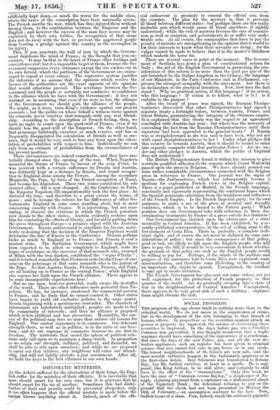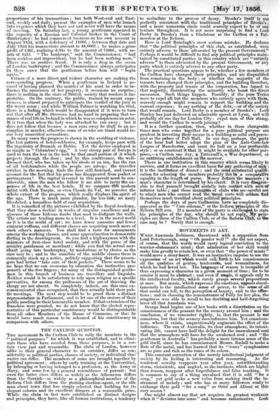SOCIAL PROGRESS.
THE progress of the age shows itself in nothing more than in the• criminal world. We do not mean in the suppression of crime, but in the development of the arts belonging to that branch of human affairs. In proportion as the securities against attack on person or property are improved, the science of overcoming those securities is unproved. In the days before gas, when Finchley Common was proverbial, it was thought wonderful that a high- wayman should have something of the appearance of a gentleman. But since the days of the new Police, gas, and all the new de- tective appliances, such an impulse has been given to criminal science that you cannot feel sure in any house or in any circle. The lowest neighbourhoods of St. Giles's are now safe, and the most notable robberies happen in the fashionable quarters or in the first-class hotels. Ikey Solomons was transferred to Botany Bay, but Mr. Sadleir survives, at least in a myth. He is sup- posed,. like King Arthur, to be still alive ; and certainly he still lives in the effect of his " transactions." Only this week we have the case of " Cunneen versus Bayley," a shopkeeper of Ne- nagh, claiming payment from a customer on a dishonoured check of the Tipperary Bank ; the defendant refusing to pay on the ground that the cheek had not been presented on Monday the 18th of February,—an assumption contrary to the fact. Now,. Sadleir is one of a class. Few, indeed, reach the sublimely gigantic }proportions of his transactions ; but both West-end and East- -end, weekly and daily, present the examples of men who launch into expenses which they have not and never will have the means ;of. meeting. On Saturday last, a young gentleman appeared in the capacity of a Russian and Colonial broker in the Court of -Bankruptcy : he had commenced business on his own account in sAugnst 1854, with a deficiency of 1100/. • between that date and -.Ally 1955 his transactions amount to 48,4001. ; he makes a gross pinflt of 1361., realizing debts to the amount of 75001., with as- seta of 1211. " The bankrupt," said the Commissioner, " had been reckless and improvident, but he had been nothing more." ?There was no positive fraud. It is only a drop in the ocean not London bankruptcy ; and the Commissioner always anticipates sit these cases that the gentleman before him will " begin again." Crimes of a more direct and violent character are making the verrespondin; progress. - When .a gentleman in Ireland is ac- cused of having planned the murder of his aunt in order to in- fluence the succession of her property, it occasions no surprise ; there is nothing in the state of tritish society that renders it im- probable.- On the contrary, the public, trained by recent expe- riences, is almost prepared to anticipate the verdict of the jury in the worst sense ; and while William Palmer is watching his trial, 'there is a feeling which would be disappointed if it were to turn nut that after all Mr. Strevens had no hand in preparing that ro- mance of real life in Ireland in which he was so conspicuous an actor. R is true that when the lady was attacked he ran away ; but it does not follow that because a man runs away he shall be an ac- complice in murder, otherwise some of us who are timid stould /n- ear very unmerited accusations.
In many cases the progress is shown in the avoiding of violence. 'The last pattern of hotel-robberies, for example, keeps pace with the ingenuity of Bramah or Hobbs. Yet the device employed is as simple as ' Columbus's egg." Avery strong pair of forceps is used to turn the key in the lock by that small portion of it which projects through the door ; and by this contrivance, the well- dressed thief, who has taken up-hips abode at an inn, has the run of all bedchambers while the people are asleep ; the traveller awakes in the morning, finds the door still fastened, and/Cannot *count for the feet that his purse has disappeared from poiket or portmanteau! The capital invested in this pursuit must Be eon- -side-table, since the men who follow it are able to incur the ex- penses of life in the best hotels. If we compare di/4 modern artist with Dick Turpin, or even Claude du Val, we perceive the ',whole extent of the progress, which really displays thesspirit of the age. There is much more plunder, far less risky no hasty bloodshed, a boundless field of easy acquisition.
It is remarked.of the pictures exhibitedb the Royal Academy, that they show a decline in works of singular excellence and an absence of those hideous daubs that used to disfigure the walls. The artists are tending more to a level. It is in the moral world as it is in the world of art ; we have fewer assassins and fewer eminent ruffians, and different classes are acquiring much more of each other's manners. You shall find a taste for amusements sMong the workifigelasses, and some approximation to democratic 0e-ling in the drawingroom. So you find a highwayman with the manners of first-class hotel society, and with the purse of the country gentleman or merchant ; while pia find the actual mer- chant going into bankruptcy, by misfortune or by choice as the
• case may be ; and in the omnibus of the middle classes there is ecommonly stuck up a notice, politely suggesting that the passen- gers had better " take care of their pockets." There seems to be am hope that we can overcome by education the instinctive pro- pensity of the five fingers ; - for many of the distinguished gentle- men in this branch of business are travellers and linguists. Neither would it be satisfactory to rely upon religion as a specific preventive, for among the professors of the art of thieving the clergy are not absent. So completely, indeed, are this once ex- communioated class recognized, that they actually hold their pub- lic meetings. The next step would be to grant them a distinct representation in Parliament, and to let one of the orators of 'their public meeting be their honourable member. If that extension of the franchise were granted., we do not know that the elected repre- sentative of this parUcular constituency would be distinguishable from all other Members of the House of Commons, or that he would have much reason to be ashamed of his constituency in comparison with others.



























 Previous page
Previous page